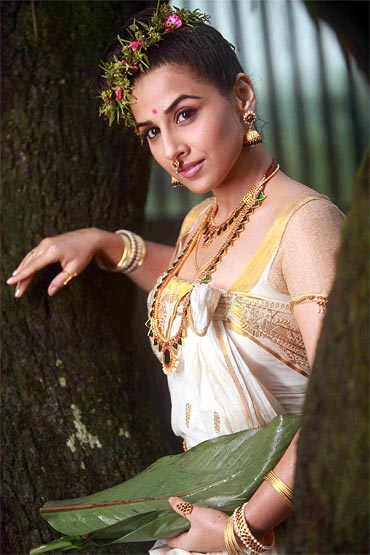
Internationally acclaimed cinematographer Santosh Sivan's latest film Urumi, is one of the most eagerly awaited Malayalam films. He is also making the Tamil, Hindi and English versions.
The film, produced by Shaji Nadesan, Santosh Sivan and Prithviraj, has an array of stars and actors from all Indian languages: Prithviraj, Genelia, Prabhu Deva, Tabu, Vidya Balan and Amol Gupte, to name a few.
Santosh Sivan's first film as a director was the children's film Halo followed by the internationally acclaimed Terrorist.
In fact, Pulitzer-prize winning movie critic Roger Ebert has included Terrorist films in his series of 'Great Movies'.
As Urumi gets ready to be released on March 31, Sivan, in the midst of postproduction work, spoke to rediff.com about the film.
What was the inspiration behind a period film like Urumi?
I like the idea of recreating the bygone era. It is interesting to think of the characters you have heard as real. Also, it excited me to have cannons, swords and urumi (curling blades) in a film. The writer of the film Shankar Ramakrishnan was really into all these historical dramas.
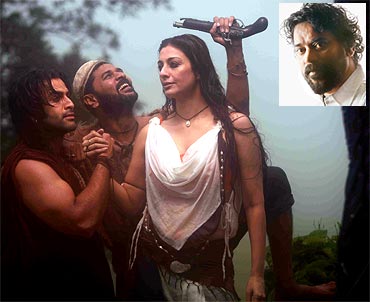
What is Urumi about?
Urumi is set in the backdrop of the warrior clans of Northern Kerala who belonged to the sixteenth century. It is the story of Chirakkal Kelu Nayanar (Prithviraj), a man with a mission to kill Vasco da Gama. Kelu meets a Muslim warrior princess Ayesha (Genelia) of the Arackal Sultanate.
Kelu has a legendary golden Urumi, made from the ornaments of dead women and children who were burnt alive in a ship that was going to Mecca. It was set on fire and sunk under the instructions from Vasco da Gama.
Vavvali (Prabhudeva) who is Kelu's childhood friend from the Muslim neighbourhood supports him in his mission
The film also has mystical characters like Makkom (Vidya Balan), a displaced Devi Deity in the form of the Oracle .
Kelu tracks his mission through treachery and treason. The organised revolt started by him was the first movement of its kind against colonial advance in India.
So, Urumi is a film about Chirakal Kelu Nayanar's revenge.
Is the story real or fictionalised?
It is part real and part fiction. Whenever someone wins, only their version of the story is recorded. I feel the characters represent the people and I do not want to portray some of them bad or some good. It is never like that in real life.
These are people from both Kerala and Tamil Nadu. For example, Vaavvali, the character played by Prabhudeva comes from Nagapattinam.
But the film is the journey of Kelu.
What is the significance of Urumi in the film?
Urumi is an interesting weapon, which can be used to keep people away and not only to attack. He uses it to take revenge.
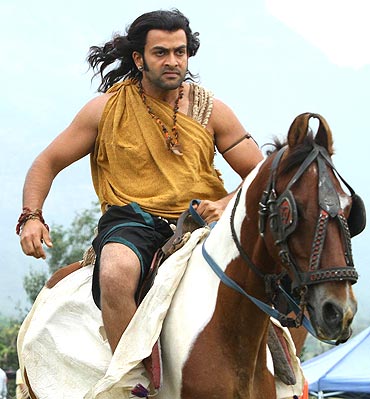
Ashoka and Before the Rains were period films and Ananthabhadram was fantasy. What fascinates you about such films?
It is the characters that fascinate me. I also like the idea of re-creating a world that I have not seen. You can use your imagination and re-create such an ambience.
Yes, in Urumi, you cannot re-create exactly how it was then, as women were topless in those days (during the Malabar period). So, you stylise the kind of dresses they wore in that era. It excites me to get into a period where air was purer, everything looked so clean and the land looked virgin.
But it is not that I like to make only period films. I have made children's films and films in all genres. I like to make all kinds of films.
Filmmaking is like reading; you read all kinds of books and don't restrict yourself to any one type.
You are a cinematographer. What is to you to direct a film?
It is not to make a living that I direct films. I want to have fun. I want to enjoy myself. I want to do something different; yes, different is a much-abused word. That is why I direct films.
What high do you get when you direct a film?
Most of the creative process is like a journey; it's a special journey from start to finish. It takes a great deal of effort to take the journey because it's very creative. The experience of making a film itself gives me a high.
If people like what you have made, it gives an even more high. Of course, people do say good and bad about your film. You have to be prepared for that.
Filmmaking is an interesting experience for me. As a cinematographer, I have worked with so many interesting directors and as a director, I have worked with so many interesting actors. Similarly, when I was asked to act, I looked on it as another experiment. Many people asked me why I decided to act (He has acted as painter Raja Ravi Varma in Lenin Rajendran's film). There are no answers to such questions.How was it working in films that are made abroad and here?
Working style is definitely different. For example, there is a lot of silence on the sets of those films while it is not so here. I am one person who likes silence on the sets but you won't get it here. For actors also, silence is very good. So, the atmosphere itself is so different.
But making a Malayalam film is much, much faster.
So, is it less strenuous making a Malayalam film?
Filmmaking itself is strenuous. While making English films, we follow a typical timetable. We start at the same time everyday and stop at six everyday. There is no question of any deviation from that. When you go for lunch also, the plates, forks and knives are kept well but here in Kerala, if you are hungry, you go to the kitchen and take whatever you want! That is the difference (Laughs).
How do you prefer to work, in a disciplined atmosphere or an informal one?
Each has its own charm. The challenge is in enjoying and relishing everything. I enjoy the kind of freedom I have here because most of the people I am working with are people I have known for decades. They are all like family.
I also enjoy working there. I had my team coming from Scotland to work here when I made Before the Rains. And they adjusted so well playing football in the afternoon, etc.
I would say it's interesting to be with your people here, at the same time, the international atmosphere also excites you. The good thing is, I get to enjoy both.
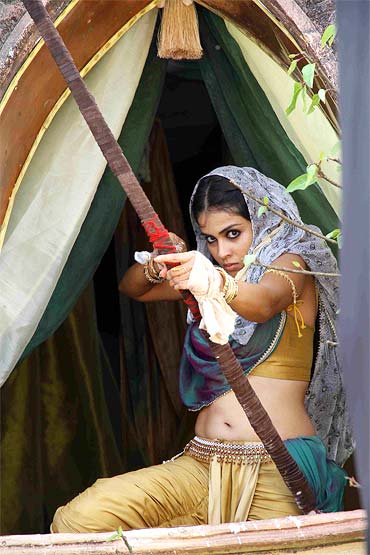
I still remember visiting the sets of your film Terrorist, 13 years ago. It was a small, informal production then. Do you still have the same passion you had when you made Terrorist or have you become more confident and relaxed?
I don't think I have become confident (Laughs). I cannot afford to be confident too. I think nobody can be confident unless he makes a formula film.
If I did not have passion for cinema, I would not have attempted a big film like Urumi. Luckily, we have different versions of the film and why we have them is because it offers potential. I want it to reach out to a bigger audience. I have hope for the Malayalam audience outside.
I felt happy when the English version (Vasco Da Gama - Urumi, The Warrior who wanted to kill Vasco da Gama), a shorter version was selected to be shown at the Hong Kong film festival.
When you made Halo and Terrorist, did you think you would be making so many films?
When I first made Halo, many people expected me to make only children's films. When I made Halo and Terrorist, each with duration that of less than 90 minutes and without songs, I made them with the intention of showing them outside India. When I can see Japanese films in India, why not show my films there?
I was a bit fortunate because I got so many awards at many festivals. Before the Rains also was presented well by Merchant Ivory and they released it all over the world.
But when I was about to make Urumi, I thought of making it with songs, which are part of our tradition and recreate that period.
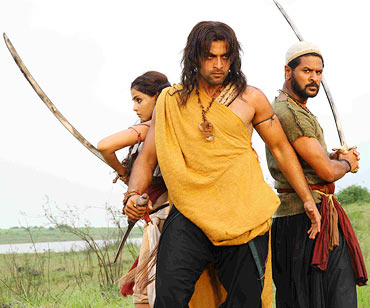
You are also doing the cinematography of Urumi. Does it not tire you, as you are the director too?
No, not at all. I cannot think of not shooting my film. It is like this: if I am directing the film, I am shooting it also. I am someone dealing with the visual language, so I cannot but shoot my own film. When I am shooting my film, I get an opportunity to convey it in the language I am are comfortable with, and for me, it is the visual language.
Your intimacies, the cultural baggage you carry, your influences come out when you shoot using the visual language you know, and here, you are not imitating the west. An artist's work becomes interesting when he has his stamp on it, which is what he carries with him as a part of his culture and background. That is when people from other parts of the world also find your work interesting.
Does that mean how you shoot a film will be influenced by your cultural background, and how and where you are brought up?
Most of what you are and who you are comes from your cultural background and travel.
I still remember, as a kid, going to my ancestral home and feeling mesmerised by the architectural marvel, the dark interiors, sharp light peeping through the jaalis, etc. The images have stayed with me.
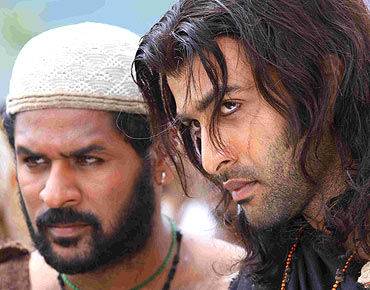
Was it exciting shooting Urumi?
It was exciting as I got to work with some very good actors. Genelia trained in Kalari for two weeks and she also learnt horse riding. For actors like Genelia, it was a different experience and actors like her want to do a different kind of cinema.
I wanted Vidya Balan to do a daasi aattam and she also trained for one and a half weeks for that. She wanted to do everything and I like this kind of commitment.
I know Amol Gupte from the FTII days. He, Aamir Khan, etc were there at the FTII when I was a student, to make Holi. I know him from then. I liked the body language he brought in as the Thampuran in Urumi. It is interesting to see such a body language.
Then, there is Jagathy (Sreekumar) who is an amazing actor. He and Amol made a great combination.
Prithviraj was there as an actor and he was also the producer. Other than acting, he was also helping the others with the dialogues.
I also had so many great actors together in Before the Rains.
These days, especially when you want to reach out to people outside the country, you put together so many actors of calibre.
How did Prithviraj become the producer of the film?
I had approached him as an actor. When we sat and discussed how we should make it, he decided to start a production house and join us. It was not planned; it just happened. Shaji Nadesan is also the producer for the film.
After making so many films, how do you feel when your film is ready for release?
Do you remember the film Perunthachan? I shot the film and won my first national award. MT Vasudevan Nair had written the story and dialogue for the film.
There is a line spoken by Perunthachan when he was making an idol for a temple. He says he sees some imperfection or the other in the statue all the time. He goes on to correct each imperfection before the consecration of the idol as he cannot touch it afterwards.
Similarly, till the release, I see some or the imperfection in my work all the time! It never ends. That is how I feel now.